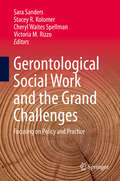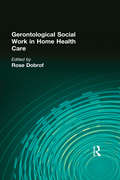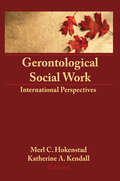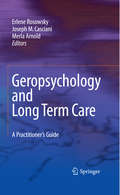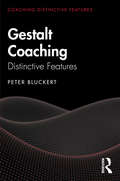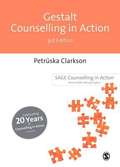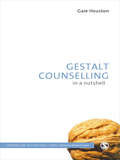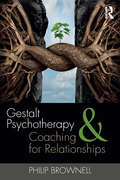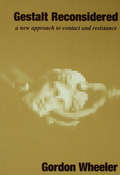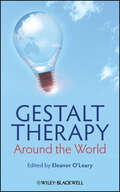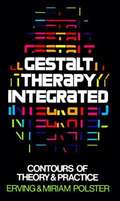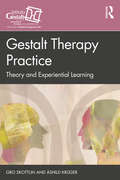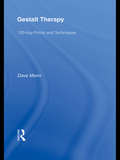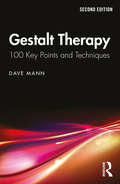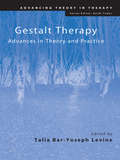- Table View
- List View
Gerontological Social Work Supervision: A Social Work Perspective In Case Management And Direct Care (Haworth Social Work Practice Ser.)
by Carlton Munson Ann Burack Weiss Frances C BrennanThis unique book clearly depicts a need for supervision in gerontological social work settings and provides a framework for approaching supervision. Grounded in two distinct bodies of literature, social work supervision and gerontological social work, this important book thoroughly examines present gerontological practice and principles and focuses on the stages and styles of helping, and teaching case workers to improve agency efficiency.Gerontological Social Work Supervision assumes some gerontological knowledge and experience with aging on the part of the supervisor, yet provides an abundance of informative and practical methods to aid agency success rates with their clients. The authors discuss the supervisory position as a positive asset in all aspects of case work and management. Throughout the chapters, the value of a supervisor is compounded, whether the supervisor is helping a worker in seeing a broader scope of the field of social work with the elderly, providing guidance through gray areas of ethics, or teaching practice skills for work with individuals, groups, or families, the need for an involved and prepared case worker supervisor becomes increasingly clear through the theories and scenarios presented. Extensive examples and helpful considerations make this an invaluable book for agency supervisors and workers. An entire chapter is devoted to providing supervision in the educational arena, promoting a greater awareness of gerontological social work in students preparing for the field. The appendices are packed with lists of additional works on supervision in social work, bibliographies of selected readings in case management, entitlement, long term care, and family caregiving.
Gerontological Social Work and the Grand Challenges: Focusing on Policy and Practice
by Sara Sanders Stacey R. Kolomer Cheryl Waites Spellman Victoria M. RizzoThe growing number of older adults in the United States poses a significant challenge to families, healthcare systems, mental health services, and many other caregiving groups. Using the Grand Challenges for Social Work initiative as a framework, this text evaluates critical policies and issues pertaining to older adults, identifying both the overall systemic inequalities currently working against older adults as well as specific areas that require updated policies and interventions. It calls for active attention to the implementation of science-based research, policy, and practices to promote health and well-being. Among the topics addressed: Family violence against older adults Disaster planning and preparedness Building financial capability for aging families Health needs of incarcerated older adultsClosing the gap in healthcare services for older adultsSocial isolation and its effects on mental health and well-being A useful gerontology resource for students, social work scholars, and practitioners, Gerontological Social Work and the Grand Challenges advocates for justice and equal opportunity for older adults, and highlights important social issues that must be urgently addressed in the near future.
Gerontological Social Work in Home Health Care
by Rose DobrofA variety of programs are described in this volume illuminating innovative approaches to service delivery.
Gerontological Social Work: International Perspectives
by Merl C Hokenstad, Jr Katherine KendallIn this fascinating book, leading international experts in gerontology and social work examine the conditions of older people in their respective native lands--Australia, Canada, West Germany, Great Britain, Israel, Japan, the Netherlands, and Sweden. In response to the need for world-wide sharing of information and research on one of the most dramatic developments of the twentieth century in the United States and throughout the western world--the aging of the populations--these professionals offer an international dimension and cross-cultural knowledge to social gerontology and gerontological social work. Emphasis is placed on the social service delivery system in each country together with an analysis of social work roles and activities. The informative articles include demographic notes, the socioeconomic characteristics of older people in each country, and the author’s forecast of trends, issues, and future directions. These timely reviews of what has worked elsewhere may spark greater creativity among educators and practitioners in social work and gerontology in finding alternative solutions to the many problems professionals face as advocates and service providers for older adults. Social work practitioners and educators examine social services for seniors in eight different industrialized countries. Each chapter--focusing on a different country--features: a review of the social service delivery system, providing information about its historical evolution and current organization a look at home care programs, as well as community based and institutionally based services a review of service availability and accesibility with consideration of how social services are coordinated with health care and other human services special attention is given to social work roles within the social service system, including an examination of direct service and planning/management roles a consideration of the importance and usefulness of social work in service provision for each country a brief analysis of current trends and furture directions for gerontological social work and social services for the elderly. The cross-national perspectives will highlight global trends in the industrial world and illuminate distinctions among countries, based upon a particular historical, political, and cultural context. Gerontological Social Work provides a wider base for understanding and evaluating policies and programs in one’s own country. Each analysis suggests new and different ways of solving problems and providing services. Social work professionals worldwide will learn successful methods of enabling the elderly to maintain maximum self-sufficiency and participate actively in society, thus insuring improved quality of life.
Gerontologische Persoonlijkheidsstoornissen Schaal GPS
by Prof. dr. van Alphen drs. G.J.J.A. EngelenGerontologische Persoonlijkheidsstoornissenschaal (GPS)S.J.P. van Alphen en G.J.J.A. Engelen Meet: Persoonlijkheidsproblematiek Leeftijdsbereik: Ouderen Afnameduur: circa 20 minuten Prijs online afname € 3,20 Toepasbaar in: GGZ, ouderenzorg, psychiatrie Kwalificatieniveau: 3 (toelichting kwalificatieniveaus) Doel van de testDe Gerontologische Persoonlijkheidsstoornissen schaal (GPS) is een instrument dat wordt gebruikt voor het screenen op persoonlijkheidsstoornissen bij ouderen. Vaak zijn instrumenten voor persoonlijkheidsproblematiek gebaseerd op criteria die zijn afgeleid uit het gedrag en de leefwereld van jongere volwassenen (Toepassingsmogelijkheden• Screening: voor screening op persoonlijkheidsproblematiek in de eerste lijn en tweede lijn• Diagnose: ter ondersteuning van het diagnostisch proces in GGZ en ouderen-GGZ• Behandeling: voor het in kaart brengen van het effect van behandeling • Onderzoek: in (wetenschappelijk) onderzoek waarin persoonlijkheidsproblematiek bij ouderen een rol speelt.Wat meet de GPS?De GPS brengt in kaart of er mogelijk sprake is van persoonlijkheidsproblematiek bij ouderen en van welke persoonlijkheidsstoornis er in dat geval sprake zou kunnen zijn. Hiertoe richt het instrument zich op habitueel gedrag (HAB) en biografische gegevens (BIO).Voor wie?De GPS kan worden afgenomen door psychologen, psychiaters, huisartsen, POH-GGZ en andere psychodiagnostisch bevoegde professionals in de eerste en tweede lijn. Afname en scoringDe GPS bevat 16 items waarop ja/nee geantwoord wordt. De afnameduur bedraagt ongeveer 20 minuten.CotanbeoordelingDe test is ter beoordeling bij de Cotan aangeboden.
Geropsychology and Long Term Care
by Erlene Rosowsky Merla Arnold Joseph M. CascianiThe ever-increasing population of older adults residing in nursing homes and long-term care communities, as reflected in numerous demographic studies, point out a clear need for geropsychologists i.e., trained specialists in the field of aging and mental health, to meet the needs of this nation's older adults. This book will provide a needed resource for psychologists working in long-term care settings and those who wish to do so. Key outcomes include the provision of high quality psychological services for this important but neglected sector namely, people living in nursing homes, assisted living communities and other LTC settings. This text will be of great value to psychologists currently working in long-term care settings who have had graduate work in geropsychology, yet desire more in-depth and practical training. A second audience includes those individuals who may have a leaning towards expanding their professional activities in long-term care and are seeking additional preparation before doing more work with older adults. A third group is comprised of those individuals who are not psychologists, yet have had some training and coursework in aging and mental health.
Geschlechterdemokratie für die Arabische Welt: Die EU-Förderpolitik zwischen Staatsfeminismus und Islamismus (essentials)
by Annette JünemannEine Machtübernahme islamistischer Parteien in arabischen Staaten befürchten vor allem säkular orientierte Frauen, von denen sich viele als Verliererinnen der ,,Arabellions" empfinden. Annette Jünemann geht der Frage nach, welchen Beitrag die Europäische Union zur Förderung von Geschlechterdemokratie in den arabischen Transformationsländern leisten kann. Bislang hat die EU im Rahmen ihrer externen Demokratieförderung im südlichen Mittelmeerraum die Agenda säkularer Frauenrechtsgruppen unterstützt. Dies geschah im stillen Einvernehmen mit den autoritären arabischen Regimen, die in einem säkularen Staatsfeminismus ein probates Mittel im Kampf gegen den politischen Islam sahen. Seit dem Arabischen Frühling ist die bisherige Förderpraxis der EU diskreditiert und verlangt eine Anpassung an die neuen politischen Realitäten.
Geschlechtersensibles Lehren im Sport: Ein Ratgeber für Universitäten, Schulen und Sportvereine
by Natalia Fast Christine-Irene Kraus Valerie KastrupWelche Rolle spielt Geschlecht im Sport und warum sind geschlechtersensibles Handeln und Lehren in diesem Feld relevant? Dieses Fachbuch nimmt das Thema Geschlecht im Kontext des Sports in den Blick. Ziel ist es, verschiedene Akteur*innen für Geschlechteraspekte zu sensibilisieren und deren Geschlechterkompetenz weiterzuentwickeln. Hierfür werden theoretische Grundlagen und allgemeine sowie spezifische Empfehlungen für einen sensiblen Umgang mit geschlechtsbezogenen Situationen in unterschiedlichen Sportsettings thematisiert. Explizit werden verschiedene Bewegungsfelder unter Geschlechterperspektive reflektiert und praktische Hinweise für den Umgang mit geschlechtsbezogenen Aspekten gegeben. Zudem werden konkrete Handlungsempfehlungen für Schule, Studium und Verein anschaulich und praxisbezogen aufbereitet. Hochschullehrende, angehende und ausgebildete Sportlehrkräfte und Übungsleiter*innen werden hierdurch befähigt, geschlechtsbezogene Phänomene in universitären Lehrveranstaltungen, im Sportunterricht sowie im Vereinssport zu identifizieren, zu reflektieren und diesen produktiv zu begegnen.
Gesellschaft und Psychodynamik: Eine systematische Skizze
by Johann August SchüleinIn diesem Text geht es um die Frage, wie Theorien der Psychodynamik zum Verständnis gesellschaftlicher Prozesse beitragen und was die dazu erforderliche Kooperation können muss. Die Frage, ob sie einen Beitrag leisten können, stellt sich nicht in einer Welt, in der bei aller instrumentellen Rationalität Ängste, Hoffnungen, Hass und Wut, Sehnsüchte und Fantasien sich ins soziale Geschehen einmischen und es mehr oder weniger massiv bestimmen. Psychodynamik ist dabei kein „Störfaktor“, sondern ein konstitutiver, motivierender und treibender, ein notwendiger, aber kein pflegeleichter oder gar beliebig kontrollierbarer Faktor jeder sozialen Realität. Um das komplexe Zusammenspiel sozialer und psychischer Realität zu erfassen, bedarf es einer entsprechenden Konzeption, die hier vorgestellt und illustriert wird.
Gesellschaftliche Selbstermächtigung in Deutschland: Fridays for Future und Corona-Skepsis im Vergleich
by Reimut Zohlnhöfer Peter Kirsch Hanno KubeZuletzt haben verschiedene Gruppen durch demonstratives Übertreten von Gesetzen Aufmerksamkeit auf ihre politischen Anliegen gelenkt, sei es die Verletzung der Schulpflicht bei Fridays for Future-Demonstrationen oder die Weigerung, sich an die Maßnahmen zur Pandemie-Eindämmung zu halten, bei Kritikern der Corona-Politik. In diesem Buch wird untersucht, was hinter diesen Regelbrüchen steckt: Unterstützer der Fridays for Future-Bewegung sind zwar unzufrieden mit der Klimapolitik, aber gut ins politische System integriert; Menschen, die sich nicht an die Corona-Regeln halten mögen, weisen dagegen zum Teil eine erhebliche Entfremdung vom und Misstrauen gegenüber dem politischen System auf.
Gesellschaftsphänomen E-Sport: Erklärungs- und Forschungsbeiträge aus einer interdisziplinären Perspektive (Angewandte Forschung im Sport)
by André Schneider Thomas WendebornDieser Sammelband bietet eine interdisziplinäre Sicht auf das Phänomen E-Sport. Die Autorinnen und Autoren gewähren mit den zahlreichen Erklärungs- und Forschungsbeiträgen zum E-Sport nicht nur tiefgreifende Einsichten, sondern liefern zugleich auch wertvolle Erkenntnisse für die Praxis. Damit richtet sich das Werk an Forschende und Studierende der Rechts-, Wirtschafts-, Sport- und Ingenieurwissenschaften sowie Praktiker von Profit- und Non-Profit-Organisationen aus dem Bereich der Wirtschaft, des Sports, der Politik und der Kultur.
Gesprächsführung in Psychotherapie und Beratung: Ein Übungsbuch mit Rollenspielen zur Vorbereitung auf die Approbationsprüfung
by Katrin HötzelEine professionelle Gesprächsführung ist in unterschiedlichsten Kontexten relevant, z. B. in der Beratung oder in der Psychotherapie. Dieses Buch bietet eine ideale Vermittlung der für gelingende Gespräche zentralen Kompetenzen: Die Grundlagen und theoretischen Konzepte der Gesprächsführung werden mit anschaulichen Fallbeispielen und praktischen Übungen verschiedener Gesprächssituationen vereint. Mit den vorgestellten Methoden und Ansätzen haben Sie einen Werkzeugkoffer in der Hand, mit dem Sie auch schwierige Situationen wie den Umgang mit Widerstand und motivationalen Schwierigkeiten im Allgemeinen händeln können. Ein besonderer Fokus liegt dafür auf dem „Motivational Interviewing“ und dessen Kernkompetenzen (offene Fragen, Reflexionen, Würdigung und Zusammenfassungen). Diese werden durch viele Beispiele veranschaulicht) Im anschließenden Übungsteil des Buches haben Sie die Möglichkeit, gemeinsam mit einem Rollenspielpartner oder in der Kleingruppe verschiedene Situationen anhand von Fallvignetten zu üben und so Ihre praktischen Fertigkeiten zu vertiefen. Zur besseren Einschätzung bzw. Evaluation der Rollenspiele werden Ratingskalen mit Reflexionsfragen bereitgestellt. Die Übungen orientieren sich an der praxisorientierten Parcoursprüfung für die Approbationsprüfung zum Psychotherapeuten und den darin definierten Stationen Patientensicherheit, therapeutische Beziehungsgestaltung, Diagnostik, Patienteninformation und leitlinienorientierte Behandlungsempfehlungen. Somit ist dieses Buch nicht nur eine praxisnahe Hilfe für alle Berufsgruppen in der Beratung und Psychotherapie, sondern auch besonders für die Prüfungsvorbereitung im neuen Approbations-Studiengang Psychotherapie geeignet.
Gesprächspsychotherapie
by Eva-Maria Biermann-Ratjen Diether Höger Jochen EckertBei der von Carl Rogers begründeten Gesprächspsychotherapie steht die therapeutische Beziehung im Mittelpunkt. Handlungsleitend ist eine Theorie des psychotherapeutischen Prozesses und der Entwicklung der Person. Das Lehrbuch vermittelt die theoretischen Grundlagen der Gesprächspsychotherapie, liefert aber auch das Handwerkszeug für das tägliche therapeutische Handeln - jeweils abgestimmt auf unterschiedliche Anwendungsfelder und Settings. Der Band enthält außerdem die Behandlungsleitlinien sowie Infos zur Aus- und Weiterbildung.
Gestalt Coaching: Distinctive Features (Coaching Distinctive Features)
by Peter BluckertGestalt Coaching: Distinctive Features makes Gestalt principles, values, and philosophy accessible to coaches of all backgrounds and explains how to apply them in practice. Peter Bluckert introduces 30 distinctive features of this approach, divided equally between theory and practice. The book provides concise but clear summaries of core concepts such as awareness and contact, the nature and power of unfinished situations, the Field perspective, the phenomenological approach, The Gestalt Cycle of Experience, and the nature of strategic and intimate interactions. Bluckert provides a set of practice guidelines and watch-outs for the Gestalt coach, information on training and development and several case examples to bring the approach to life. Gestalt Coaching reveals how this approach can be used in individual development, such as executive coaching, with groups and teams, and in wider social and political contexts. With a focus on personal growth and development and enhancing co-operation, dialogue, and relationships, this book will be an invaluable tool for coaches of all backgrounds in practice and in training, academics and students of coaching, and anyone interested in learning more about how to apply Gestalt principles in their personal and professional life.
Gestalt Counselling in Action
by Petruska ClarksonSAGE celebrated the 20th Anniversary of the Counselling in Action in November 2008. To view the video - click here ------------------------------------------------------ `The reader looking for a clear and comprehensive introduction to Gestalt counselling need look no further. This work can be recommended wholeheartedly' - British Gestalt Journal `A handy update to Gestalt that shows it to be a mature and sophisticated approach to personality that has lost little of its inventiveness, iconoclasm and authenticity...a very useful source book' - Self and Society Gestalt Counselling in Action is a bestselling text , which has sold over 30,000 copies. Now in it's Third Edition, the book continues to be a popular text for training in counselling and psychotherapy and with practitioners who are new to the gestalt approach. Drawing on over 30 years experience as a gestalt practitioner, trainer and supervisor, Petruska Clarkson has written a lively and authoritative introduction to the approach, beginning with the theoretical and philosophical basis of gestalt. She clearly sets out the six main phases of the therapeutic process, introducing us to a client, 'Gary', whose case is used throughout the book to illustrate the process of therapy and the techniques used in each of the phases. Fully revised and updated, Gestalt Counselling in Action, Third Edition includes a new chapter which explores recent developments in the field and looks to the future for the gestalt approach.
Gestalt Counselling in Action (Counselling in Action)
by Petruska Clarkson Simon CavicchiaSimon Cavicchia has oriented Clarkson's seminal work of Gestalt Counselling in Action within a more contemporary context, adding voices of significant and divergent thinkers as counter-point and extensions of the author's work. Michael Clemmens, Gestalt Institute of Cleveland, USA This popular and well written book which is now in its 4th edition provides an accessible and thorough introduction to the Gestalt approach. Danny Porter, Manchester Gestalt Centre Now 24 years old with over 40,000 copies sold worldwide, Petruska Clarkson's classic text is the definitive introduction to Gestalt therapy. This fourth edition, updated by Simon Cavicchia, covers the latest in Gestalt theory, research and practice. It includes: An extended case study running through the book to help you understand the process of therapy and the techniques used in each of the phases. Learning features and case examples translating theory into practice. New 'reflection sections' showing you the most recent developments in the field. New material on the relational turn and research. As a student of Gestalt therapy, this is the one book you need to buy; it offers a uniquely practical and accessible approach to an often complex topic. Petruska Clarkson was a professor and fellow of the British Association for Counselling and Fellow of the British Psychological Society. Petruska sadly passed away in 2006. Simon Cavicchia is a primary tutor on the MSc in Gestalt Psychotherapy and Joint Programme Leader of the MSc in Coaching Psychology/MA in Psychological Coaching, both at Metanoia Institute, London.
Gestalt Counselling in a Nutshell (Counselling in a Nutshell)
by Ms Gaie HoustonNew to the bestselling Counselling in a Nutshell Series, this pocket-sized book is the beginners guide to the essentials of Gestalt Therapy, from its principles to practice. Assuming no previous knowledge of the subject, the book introduces: - the origins of the approach - the key theory and concepts - the skills and techniques important to practice. Written in an accessible, jargon-free style, this book includes vivid case examples, end of chapter exercises and a glossary of terms to help aid understanding. Gaie Houston is a writer, UKCP-registered psychotherapist and senior lecturer at The Gestalt Centre, London.
Gestalt Psychotherapy and Coaching for Relationships
by Philip BrownellGestalt Psychotherapy and Coaching for Relationships provides psychotherapists and coaches with a thorough understanding of two-person dynamics and offers practical interventions for working with couples and with two-person teams within larger organizations. Part I of this text relates contemporary gestalt therapy theory and gestalt-based coaching to developments in phenomenology, hermeneutics, cognitive science, extended cognition, embodiment, and kinesthesiology. Through a variety of narratives, Part II builds upon these themes and examines issues that typically emerge during couples work, including infidelity, provocative language, asymmetric relationships, sex, the use of emotion, limits and boundaries, and spirituality. Also included are general strategies for assimilating coaching into psychotherapy and vice versa, as well as recommendations for further study.
Gestalt Reconsidered: A New Approach to Contact and Resistance
by Gordon WheelerIn this original and penetrating work, the origins of the Gestalt psychotherapy model are traced back to its roots in psychoanalysis and Gestalt cognitive and perceptual psychology. Drawing new implications for both Gestalt and psychotherapy in general from these origins - and with special emphasis on the neglected work of Lewis and Goldstein - Wheeler develops a revised model that is more fully "Gestalt" and at the same time more firmly grounded in the spectrum of tools and approaches available to the contemporary psychotherapist. Along the way, a number of new insights are offered, not just in Gestalt, but in the working of the psychoanalytic and cognitive/behavioral models. The result is an integrated approach giving a fresh perspective on the universal processes of contact and resistance, both in psychotherapy and in social systems in general. The practitioner is given these tools for "addressing problems at the intra- and interpersonal level and wider systematic levels at the same time, and in the same language." Each chapter stands alone, and makes a fresh and significant contribution to its particular subject. Taken together, they constitute a remarkable excursion through the history of psychotherapy in this century, weaving powerfully through social psychology, behaviorism, and Gestalt itself, yielding a masterful new synthesis that will interest the practitioners of Gestalt and other schools alike.
Gestalt Therapy Around the World
by Eleanor O'LearyThe first internationally focused book on gestalt therapy to provide a comprehensive overview of current practice around the world. Features coverage of the history, training, theoretical contributions, and research initiatives relating to gestalt therapy in seventeen countries Points to future directions and challenges Includes extensive information on worldwide gestalt associations, institutes, and professional societies that promote the development of the approach
Gestalt Therapy Integrated: Contours of Theory and Practice
by Erving Polster and Miriam PolsterExplains the fundamentals of the behavioral theory that is based on an integrated view of the personality. For the student and the professional.
Gestalt Therapy Practice: Theory and Experiential Learning (Gestalt Therapy Book Series)
by Gro Skottun Åshild KrügerThis essential new book gives the reader an introduction to the fundamental concepts of gestalt therapy in a stimulating and accessible style. It supports the study and practice of gestalt therapy for clinicians of all backgrounds, reflecting a practice-based pedagogy that emphasises experiential learning. The content in this book builds on the curriculum taught at the Norwegian Gestalt Institute University College (NGI). The material is divided into four main sections. In the first section, the theoretical basis for gestalt therapy is presented with references to gestalt psychology, field theory, phenomenology, and existential philosophy. In the later parts, central theoretical terms and practical models are discussed, such as the paradoxical theory of change, creative adjustment, self, contact, contact forms, awareness, polarities, and process models. Clinical examples illustrate the therapy form’s emphasis on the relational meeting between therapist and client. Detailed description of gestalt therapy theory from the time of the gestalt psychologists to today, with abundant examples from clinical practice, distinguishes this book from other texts. It will be of great value to therapists, coaches, and students of gestalt therapy.
Gestalt Therapy: 100 Key Points and Techniques (100 Key Points)
by Dave MannGestalt therapy offers a present-focused, relational approach, central to which is the fundamental belief that the client knows the best way of adjusting to their situation. By working to heighten awareness through dialogue and creative experimentation, gestalt therapists create the conditions for a client's personal journey to health. Gestalt Therapy: 100 Key Points and Techniques provides a concise guide to this flexible and far-reaching approach. Topics discussed include: the theoretical assumptions underpinning gestalt therapy gestalt assessment and process diagnosis field theory, phenomenology and dialogue ethics and values evaluation and research. As such this book will be essential reading for gestalt trainees, as well as all counsellors and psychotherapists wanting to learn more about the gestalt approach.
Gestalt Therapy: 100 Key Points and Techniques (100 Key Points)
by Dave MannGestalt therapy offers a present-focused, relational approach, central to which is the fundamental belief that the client knows the best way of adjusting to their situation. This new edition of Gestalt Therapy: 100 Key Points and Techniques provides a concise, accessible guide to this flexible and far-reaching approach. Substantially updated throughout, topics discussed include: the theoretical assumptions underpinning gestalt therapy gestalt assessment and process diagnosis field theory, phenomenology and dialogue ethics and values evaluation and research. As such this book will be essential reading for gestalt trainees, as well as all counsellors and psychotherapists wanting to learn more about the gestalt approach.
Gestalt Therapy: Advances in Theory and Practice (Advancing Theory in Therapy)
by Talia Bar-Yoseph LevineThe Gestalt approach is based on the philosophy that the human being is born with the healthy ability to regulate needs and wants in relationship with the environment in which she/he lives. Heightening of personal awareness and exploration of needs is enabled by the therapist who actively engages in supporting and assisting the therapeutic journey of the client. Gestalt Therapy: Advances in Theory and Practice is a collaboration of some of the best thinkers in the Gestalt therapy approach. It offers a summary of recent advances in theory and practice, and novel ideas for future development. Each chapter focuses on a different element of the Gestalt approach and, with contributors from around the world, each offers a different perspective of its ongoing evolution in relation to politics, religion and philosophy. Incorporating ideas about community, field theory, family and couple therapy, politics and spirituality, this book will be of interest not only to Gestalt therapists but also to non-Gestalt practitioners, counsellors, psychologists, psychiatrists and other mental health professionals. Counselling, behavioural science and psychotherapy students will also find this a valuable contribution to their learning.

